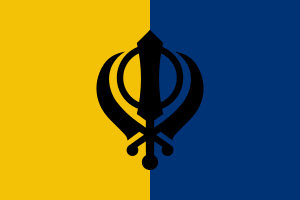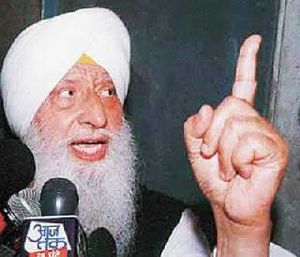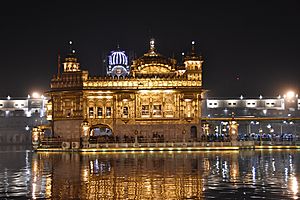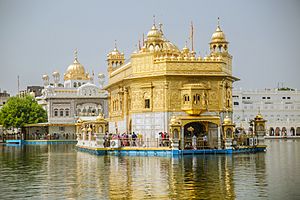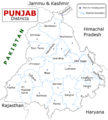Khalistan movement facts for kids
The Khalistan movement is a political movement that wants to create an independent country for Sikh people. This new country would be located in North-Western India. A Sikh state, called the Sikh Empire, existed in the Punjab from 1709 to 1849.
The historical Sikh Empire had its capital in Lahore, which is now in Pakistan. Most of the old Sikh Empire is now part of Pakistan, including cities like Lahore, Multan, Peshawar, and Kashmir. The new country, if created, would be called Khalistan. It would be in the modern areas of East Punjab and Himachal Pradesh. Its capital might be Chandigarh or Amritsar.
History of the Khalistan Movement
The Khalistan movement was most popular in the 1970s and 1980s. Today, it is much smaller. Some people claim that supporters of the movement outside India help fund young people. This funding might go to groups working for a Sikh homeland.
On April 12, 1980, Jagjit Singh Chauhan, a key supporter, met with Indira Gandhi, who was India's Prime Minister. After this meeting, he announced that he had formed the National Council Of Khalistan. He said this happened at Anandpur Sahib. Chauhan declared himself the President of this movement. Balbir Singh Sandhu was named its Secretary General.
In May 1980, Chauhan traveled to London. There, he announced the creation of Khalistan. A similar announcement was made by Sandhu in Amritsar. Sandhu also released special stamps and currency for Khalistan.
Key Events and Challenges
In the 1980s, some supporters of the movement used violence. The Indian Army also used force in response. In one important event, the Indian Army entered the Harmandir Sahib, also known as the Golden Temple. This is the holiest Sikh shrine. The Indian Government faced criticism for how they handled this operation. It led to deaths on both sides and damage to the Temple.
Many Sikhs felt that the Indian Government had disrespected their most sacred place. Later, Indian Prime Minister Indira Gandhi was killed by her two Sikh bodyguards. After her death, many thousands of Sikhs were killed in violent riots. In January 1986, militants from the All India Sikh Students Federation and Damdami Taksal took over the Golden Temple again.
On January 26, 1986, a large gathering at the Temple passed a resolution. This resolution supported the creation of Khalistan. People who supported Khalistan said it should be a state where Sikhs are the majority.
The Constitution of India does not allow new states to become independent from India. Different groups who wanted Khalistan fought against the Indian government. This fight is called an insurgency. Indian security forces stopped this insurgency in the early 1990s. Since then, there has been little activity inside Punjab to create a Sikh state. However, some groups that support Khalistan, like Dal Khalsa (International), are still active outside India.
Images for kids
-
Maharaja Ranjit Singh's Sikh Empire at its largest around 1839. Most of this area is now in Pakistan.
-
The British Punjab Province in 1909.
-
A map of the current Indian state of Punjab. After India was divided, East Punjab became PEPSU. This area was further divided in 1966. New states like Haryana and Himachal Pradesh were formed, along with the current state of Punjab. Punjab is the only state in India where most people are Sikh.
-
Former Major General Shabeg Singh led the pro-Khalistan Sikh separatists inside the Harmandir Sahib.
See also
 In Spanish: República Federal de Jalistán para niños
In Spanish: República Federal de Jalistán para niños
 | John T. Biggers |
 | Thomas Blackshear |
 | Mark Bradford |
 | Beverly Buchanan |


